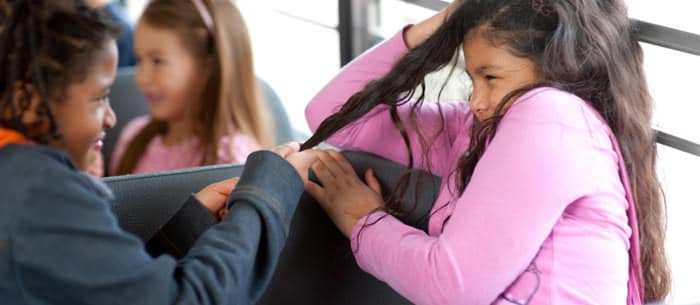It’s probably one of a mother’s top dreaded moments; confronting the time when her child gets picked on or bullied. Parents often feel powerless when this happens, and for an understandable reason.
Are there gender differences within the attacks? Yes. As toddlers, girls and boys are equally prone to use physically aggressive tactics to resolve conflicts. But around the age of 4, boys tend to express their hostility more directly and physically, while girls tend to display their aggression in more socially manipulative ways. Known as relational aggression, some of these behaviors include: excluding chosen classmates socially; spreading rumors and lies; stealing friends; and stabbing peers in the back.
The Signs of a Mean Girl
Because there is no physical evidence for this kind of bullying, relational aggression is often hard to detect. In some cases it’s even labeled “the normal pains of growing up.” Girls, who engage in these types of attacks, are often skilled at keeping their behaviors hidden from adults.
This behavior is not unique to adolescents either; pre-school aged kids have been known to be relationally aggressive too. During the pre-school years, relational aggression is more obvious and less sophisticated, due to a child’s cognitive development. As girls get older, they become more clever about how to target their victims. Technology has only exasperated the problem, turning what used to be hand written notes, into very public cyber bullying and texting nightmares.
Contrary to what the experts once thought, these “mean girls” don’t have low self esteem at all. In fact, they appear to enjoy feeling dominant and abusing their power. These girls are often well liked by both parents and teachers. They do well academically and may even be friends with their victim.
How to Protect Your Daughter from Bullies
So what’s a parent to do? The unsettling news is, we can’t completely shield our kids from every instance of hurt, and perhaps that’s a good thing. Being exposed to some peer meanness and overcoming it, can help kids develop some protective interpersonal tools. And in overcoming hurtful acts, they boost their self-esteem and sense of self competency. Having said that, there are things parents can and should do to help protect their kids from girl on girl aggression..
- Encourage awareness: Discuss what’s going on with your child. Have her talk to her teachers and guidance counselors about the situation, if things persist. While it’s important for her to take charge, you should inform the school about what’s going on separately as well.
- Role play: Act out the best ways to handle these mean girls. Practice possible scenarios. Use role playing as a way to teach your child how to protect herself from abusive situations.
- Be honest: Talk about times when you were treated badly at her age, and anything that helped you to get through it.
- Find role models: Many books and young novels deal with characters who face and overcome bullying. A clerk in a good book store will point you to some. Also look online for celeb stories of handling bullies. Many actors, writers and other public figures (even Kate Middleton) have their own personal stories about dealing with cruel classmates.
- Plan fun: Facilitate your child’s time with good friends, who are loyal and supportive of her. If need be, encourage her to find new friends and new interests.
- Remind her she’s fabulous: Let your daughter know there is nothing wrong with her. Bullies target others so they can feel better about themselves. She shouldn’t take it personally. And if your words get shrugged off as “you’re my mom, you have to say that,” encourage people your daughter admires (cool babysitter, fun aunt, nice neighbor) to give a praise or two.
Should You Contact the Bully’s Parents?
If you feel the need to reach out to the parent of a “mean girl,” try to do so in a non-attacking way. Studies show girls who act mean also suffer from long-term problems such as depression and suicide. If this parent is a friend, tread lightly. Inform your friend what you know about the situation, and then ask for her insights and thoughts about how to proceed. She may have another viewpoint, which is also valuable and helpful.
Research finds the best way to permanently reduce bullying and relational aggression is to not normalize or ignore it. Discuss bullying with your child. Raise her awareness, but also treat this as a community problem. Providing intervention and empathy education, in our homes, school systems and in our community, is the best way to reduce the problem itself.
How Your Babysitter Can Help
Is there a role for your nanny or babysitter in all of this? “Yes!” Many moms and dads consider their nanny to be a co-parenting partner when it comes to raising their kids. Considering she might be in charge of school drop-off or pick up, play-date arrangements and computer time (cyber-bullying awareness), and she might be considered more of a confidant than a caregiver, your nanny could be tuned in to some inner-circle situations.
That means it’s important for parents to maximize their nanny’s intimate knowledge of their child. If bullying is a concern, ask her to be alert and look for her thoughts and observations on what’s going on. Encourage her to be your second pair of eyes and ears.
Very often your nanny has a special connection with your child. Make the most of this relationship. A youthful or college-aged sitter might have a cool-factor to her advice. Or, this loving person might just be a trusted advisor. You can never have too many support systems when you’re a parent, or a child. When you encourage your nanny to be an adviser, this also sends her the message she is valued and respected. She may have a distinct perspective on the situation which proves invaluable to your daughter’s life.
